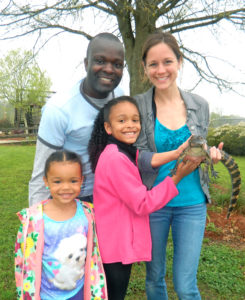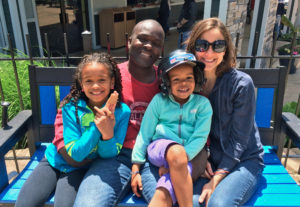
Recently I had the pleasure of talking to my fellow blogger, Amy Haribor, about family, her blog, mother in the mix, and bi-racial hair issues.
How did you get involved in Mixed Remixed?
I am a part of the online Mixed Race Family Support Group, where I read about the Mixed Remixed festival, which was looking to expand its blogging team. I was so excited that such a community existed, and I certainly wanted to be a part of it. I contacted Joy Stoffers and Heidi Durrow, and the rest is history.
Have you and the rest of your family attended the Mixed Remixed festival?
Unfortunately, my family and I are unable to attend the Mixed Remixed festival. Mostly, our reasons have to do with logistics. On the other hand, I’m not sure if my family is ready for Mixed Remixed. My husband, who is Ghanaian-American, is not 100% on board with embracing a community based on your racial identity. Although he is black, he does not feel a great connection to the black community in general. While growing up in Ghana, being black was never a big deal (most people are black in Ghana). Later his family moved to another country where my husband was then raised in an international community of people with all ranges of skin color. People were more interested in your country of origin and the language you spoke, rather than the color of one’s skin. My husband never felt his blackness was important. Then at age 16, my husband moved to South Dakota to attend a Christian boarding school. He believes he was the one black guy in the whole town, but never was made to feel out of place. The community was so excited to welcome somebody from Ghana. It was not until my husband was in his early twenties and attending pharmacy school in St. Louis that he gave any thought to the fact that he was black. Therefore, because my husband feels ambivalent towards his skin color, he does not fully understand why our daughters should care about their being biracial. Perhaps he is right. Perhaps our girls will grow up and being mixed will not impact their identities. However, I believe that my husband’s personal story is a unique one, and I want my girls to be connected to a community that will embrace their mixed heritage. I know that the Mixed Remixed festival will be one of the many communities that will welcome my daughters.
What was the most surprising thing for you about being the parent of mixed race children?
I think when an interracial relationship has black in the mix (black/white, black/Asian, black/Latino, etc.); the assumption is that the kids’ hair is some type of life jail sentence. However, I have not felt this way at all! Figuring out how to make my daughters’ hair look their best has been challenging – but never burdensome and I am so grateful for the informative websites that I have visited the past seven years.
For me, the most surprising aspect of being the parent of mixed race children has been the bold, random questions asked by strangers. I cannot understand how an adult would think it is appropriate to walk up to a total stranger and ask that stranger if her children are adopted while the children are standing right there! If my kids are adopted, does that matter? Is that piece of information the most crucial aspect of their being? Do they want to discuss their adoption story with a random dude at the grocery store? If my kids are not adopted, do my children need a stranger to inform them what they already know – that mommy’s skin does not match their own skin? Is the answer to that question any of their business? Why do random people think that they have the right to know my family’s story?
To what extent do you think that there is a shared “mixed race experience?”
It is my belief that there has to be a shared experience! Of course every individual is impacted by a variety of factors – the acceptance of extended family members, the diversity of the community in which they reside, the racial/ethnic make up of the family’s “mix,” the variance of skin colors within the mixed family, how “different” the children look from their parents, how many other mixed families are in their social network, etc. Nevertheless, a feeling of connection and camaraderie has to be there! I, personally, feel a connection with other parents of mixed-race children. For me, the ethnic and racial make up of the family does not matter. The connection still exists. We have family friends with a variety of racial make-ups including Filipino/White, Syrian/Nigerian, Chinese/Black, Black/White, White/Indian, and White/Mexican. I feel like the support of these friends is invaluable. I can talk about certain topics with these moms on a different level. They just get it! And of course, when I have friends with daughters who have black in their mix, the hair is always a source of bonding. My older daughter thinks that I am the hair guru for several of our family friends. She says, “You and <fill in the name> sure do love to talk about hair!”
This particular blog post of yours, spoke to me – what responses have you had?
It’s interesting that you felt connected with this article because it generated very little response. I feel like people prefer it when I embark upon a rant of the many different types of irritating comments, questions, and experiences that people of the mixed community must endure. When I told this sweet story of that awesome pizza guy who made the wonderful assumption that my biracial (but black looking) daughter and my Chinese-American neighbor girl were both my children, people were like, “Oh, that’s nice.”
I wrote that blog post to not only inform others, but also to remind (and re-remind) myself that plenty of people out there are cool with my family and do “get it.” I think it is all about exposure and education.
Thank you, Amy, for sharing your stories with us.
by Clare Ramsaran
@clareram
